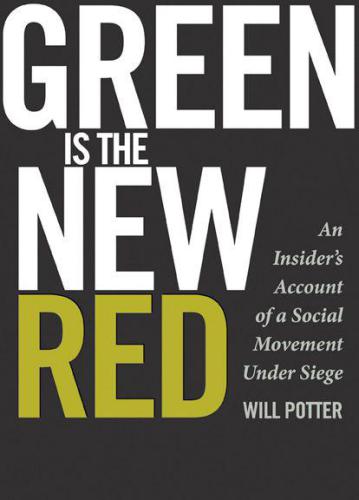
Green Is the New Red
An Insider's Account of a Social Movement Under Siege
کتاب های مرتبط
- اطلاعات
- نقد و بررسی
- دیدگاه کاربران
نقد و بررسی

April 25, 2011
Potter (a contributor to The Next Eco-Warriors) warns that the U.S. government is using post-9/11 anti-terrorism resources to target environmentalists and animal right activists (in some cases for doing nothing but speaking up). After being threatened with a domestic terrorist label for leafleting, Potter turned to uncovering the "Green Scare" and details here the story of the Animal Liberation Front (ALF) and controversial protests that resulted in severe jail sentences for participants. Tracing funds from animal-exploiting corporations to Congress and the passing of the big business-friendly Animal Enterprise Terrorism Act, Potter reports on an increased usage of the terrorism enhancement in court cases. Citing Freedom of Information Act sources, he reveals that the U.S. government has constructed secret prisons, or Communication Management Units (CMUs), to house suspected terrorists in conditions even more extreme than those of Supermax facilities (which house Zacarias Moussaoui and Eric Rudolph, among others). Potter warns of the crumbling of "the legal wall separating âterrorist' from âdissident' or âundesirable,'" and concludes his account with a call to action and a decry of the injustice that results in the "terrorist" label being put on those who threaten American corporate interests. Alarming.

March 1, 2011
In this hard-hitting debut, journalist Potter likens the Justice Department targeting of environmentalists today to McCarthyism in the 1950s.
The author argues that culture war is "at the heart of U.S. domestic and foreign policy, from the Red Scare to the War on Terrorism." Citing historian Richard Hofstadter, he describes this as " 'the paranoid style in American politics'...the eternal fear...that the American way of life is under attack." Potter's concern with the targeting of environmental activists began with a personal experience. Although he became a vegan when he was a student at the University of Texas and joined a few activist groups to protest economic sanctions in Iraq, in 2002 he was working as a journalist for the Chicago Tribune. On a whim, he participated in a canvassing campaign organized by a group called Stop Huntingdon Animal Cruelty, whose aim was to close down the laboratory of Huntingdon Life Sciences, guilty of "repeated animal welfare violations." The organizers were arrested for trespass, and shortly thereafter two FBI agents appeared at Potter's apartment requesting information about the group. He was told that if he refused to cooperate with them, his name would be included on the domestic terrorist list. The author describes how the experience marked the beginning of a personal and political journey that led him to question why environmentalists were being treated as domestic threats on par with terrorists. Though he does not deny that animal-rights groups have been guilty of crimes such as arson, he charges that different standards are used to judge anti-abortion activists and environmentalists "not because of the nature of the crime but because of the politics of the crime." Potter left the Tribune and became actively involved in the legal defense of so-called "eco-terrorists."
A shocking exposé of judicial overreach.
(COPYRIGHT (2011) KIRKUS REVIEWS/NIELSEN BUSINESS MEDIA, INC. ALL RIGHTS RESERVED.)

























دیدگاه کاربران